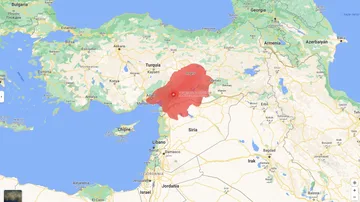In the early hours of February 6, a magnitude 7.8 earthquake struck southern Turkey and northern Syria. A tremor that will go down in history. According to the World Health Organization, it is the “worst natural disaster” in the European region in more than a century.
The first earthquake was followed by numerous aftershocks and another of magnitude 7.5, already at noon, when rescue teams were pulling people out of the rubble.
Human casualties. The death toll now rises to 51,000 between the two countries. And there are thousands who are still missing. At least 1.5 million people have lost their homes.
- In Turkey, the College of Physicians has questioned the data provided by the authorities. They think they are more.
- From the first days, when the official figure was around 41,000 deaths -one month later the exact official figure is 45,968- various humanitarian associations on the ground raised the figure by 50%.
- The earthquake has also left hopeful stories: like little Aya’s. The newborn baby was the only survivor of her family. She became a symbol of the earthquake and was about to be kidnapped. Finally, her great-uncle has taken over custody.
Meanwhile… More than 156,000 buildings were affected in Turkey alone: some of them collapsed on the spot, but many others had to be demolished in a controlled manner. They still continue to do so today.

Area affected by the earthquake in Turkey and Syria | googlemaps
Rubble the size of Barcelona. According to the United Nations Development Program (UNDP), some 200 million tons of debris have been generated. If they were all stacked together, at a height of one meter, they would occupy an area of 100 square kilometers. What is the same: the entire city of Barcelona.
- Turkish President Erdogan, whose re-election is at stake on May 14, has promised that in one year everything will be rebuilt. The experts ask for calm: it is better to do it safely than quickly.
- Erdogan has also ordered the arrest of more than 130 architects and builders for failing to comply with the country’s anti-seismic law on their projects. Between seven and ten million buildings do not comply throughout Turkey. Those arrested fight back: the government has spent years being permissive and improperly granting licenses. In fact, he amnestied several constructions that did not conform to the norm.
- The Turkish newspaper ‘Ekonomim’ has calculated that the reconstruction in the ten devastated provinces will cost more than 42,000 million euros.
Help is needed. The international community mobilized in a matter of hours, more than 100 countries committed to sending it.
- The European Union activated the Integrated Political Crisis Response (IPCR) agreements, an exceptional mechanism for coordinating all support measures from the presidency of the Council.
- In addition, Spain sent two ships and two military planes, as well as several fire teams, which went to Turkey and achieved miraculous rescues.
- From civil society, the emergency committeeformed by several NGOs, also had collection points for help or bank accounts in which to make deposits.
Yes, but… aid has been insufficient in Syria. Before the earthquake, around 90% of the population lived below the poverty line, according to UN data. The United Nations has received less than half of the required $400 million. The natural disaster has added to the complex political reality of the area. It affected regions under opposition control and they were there for four days without receiving any kind of help, because the Syrian government did not allow their passage.
- The Spanish NGO OlVIDAdos has been on the Turkish-Syrian border since February 12. Their spokesperson, Olga, tells us that “the situation is devastating” there.
- He relates that hundreds of families “are sleeping under the trees” because there are not enough tents. He tells us that they lack everything: coal to heat themselves, food for adults, and milk and diapers for babies.
- OlVIDAdos has already provided assistance to a thousand families in the area, but its work is not finished and They ask that the aid not stop either.
Next steps: It is estimated that more than two million people have left the affected areas in which they lived. Many of them, it is believed, will end up trying to reach Europe.
- Spain promised to welcome in March refugees who have lost their homes or who have been forced to leave them as a result of the earthquake.
- The first 89 arrived this weekend at the Torrejón de Ardoz air base, where they were received by José Luis Escrivá, Minister of Inclusion, Social Security and Migrations.
Source: Lasexta
Ricardo is a renowned author and journalist, known for his exceptional writing on top-news stories. He currently works as a writer at the 247 News Agency, where he is known for his ability to deliver breaking news and insightful analysis on the most pressing issues of the day.











